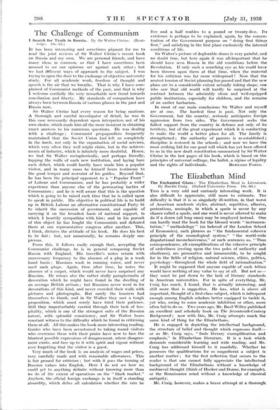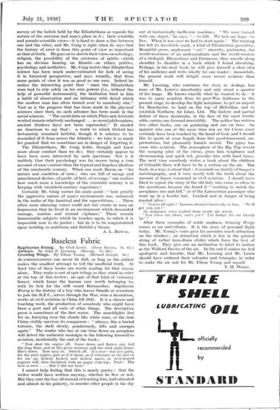The Elizabethan Mind
The Enchanted Glass : The Elizabethan Mind in Literature. By Hardin Craig. (Oxford University Press. lOs. 6d.)
Tins is a very odd and curiously interesting work. It is also difficult to appreciate, still more to estimate. The difficulty is that it is so singularly ill-written, in that worst of American academic styles, abstract, repetitive, allusive, pretentious, unsimple, in which a spade is never by any chance called a spade, and one word is never allowed to make do if a dozen (all long ones) may be employed instead. One can hardly read the book for the blessed words " instrumen- tation," " methodology " (so beloved of the London School of Economics), such phrases as " the fundamental cohesive principle of the cosmological system," " the world-wide disputational inconclusiveness," or such sentences as, " Thus correspondences, all exemplifications of the cohesive principle of orderliness (resting upon the two poles of authority and obedience), are permeative and innumerable, to be sought for in the fields of religion, natural science, ethics, politics, psychology—throughout the whole field of rationalisation."
It might be supposed that anyone capable of such Ulises would have nothing of any value to say at all. But not so— they must be put down to the lack of literary standards in American universities. For in spite of everything, Mr. Craig has much, I found, that is actually interesting, and still more that is suggestive. He has, what is above all important, thought of a first-class subject, which is infrequent enough among English scholars better equipped to tackle it, yet who, owing to some academic inhibition or other, more often fail to do so. Two years ago, Mr. Basil Willey published an excellent and scholarly book on The Seventeenth-Century Background ; now with this, Mr. Craig attempts much the same kind of thing for the Elizabethans.
He is engaged in depicting the intellectual background, the structure of belief and thought which expresses itself— or as Mr. Craig says, " finds literary exemplification and emphasis," in Elizabethan literature. It is a task which demands considerable learning and wide reading, and Mr. Craig has addressed himself to it manfully. Whether he possesses the qualifications for so magnificent a subject is another matter ; for the first reflection that occurs to the reader is that one cannot fully appreciate the intellectual background of the Elizabethans without a knowledge of mediaeval thought (think of Hooker and Donne, for example), or the Renaissance mind without a knowledge of classical antiquity.
Mr.. Craig, however, makes a brave attempt at a thorough. survey of the beliefs held by the Elizabethans as regards the nature of the universe and man's place in it ; their scientific and pseudo-scientific views—it is hard to draw a line between one and the other, and Mr. Craig is right when he says that the history of error is from this point of view as important as that of truth. He goes on to sketch their views on astrology, religion, the possibility of the existence of spirits—which has an obvious bearing on Hamleton ethics, politics, psychology and aesthetics. Mr. Craig insists that Elizabethan science has been much under-estimated for lack of seeing it in historical perspective, and says, roundly, that from some points of view it was as good as our own. Indeed he makes the interesting point that " since the Elizabethan man had to rely solely on his own powers [i.e., without the help of powerful instruments], the limitation bred in him a habit of observation and an intimacy with detail which the modern man has often turned over to somebody else." Vast as is the progress that has been made in the physical sciences since then, no such advance has been made in the social sciences. " The social data on which Plato and Aristotle worked remain relatively unchanged . as moral philosophers, ancient thinkers have not been superseded." It needed an American to say that : a truth to which Oxford has fortunately remained faithful, though it is salutary to be reminded of it from across the Atlantic : we take it so much for granted that we sometimes are in danger of forgetting it.
The Elizabethans, Mr. Craig holds, thought and knew more about conduct than we do ; they certainly appear to have been more interested by such questions. Nor is it unlikely that their psychology was far nearer being a true account of men's nature than the typical and hopeless idealism of the nineteenth century. When one reads Bacon on the nature and condition of men ; who are full of savage and unreclaimed desires, of profit, of lust, of revenge," one realises how much more a knowledge of the sixteenth century is in keeping with twentieth-century experience !
Certainly Mr. Craig carries his main point—" how greatly the aggressive nature of man's environment was enhanced in the realm of the fanatical and the superstitious. . . These often more alarming voices could not but create in man an impression that he lived in an environment which demanded courage, caution and eternal vigilance." There remain innumerable subjects which he touches upon, to which it is impossible now to do justice ; but he is to be congratulated upon tackling so ambitious and fruitful a theme.
A. L. RowsE.







































 Previous page
Previous page